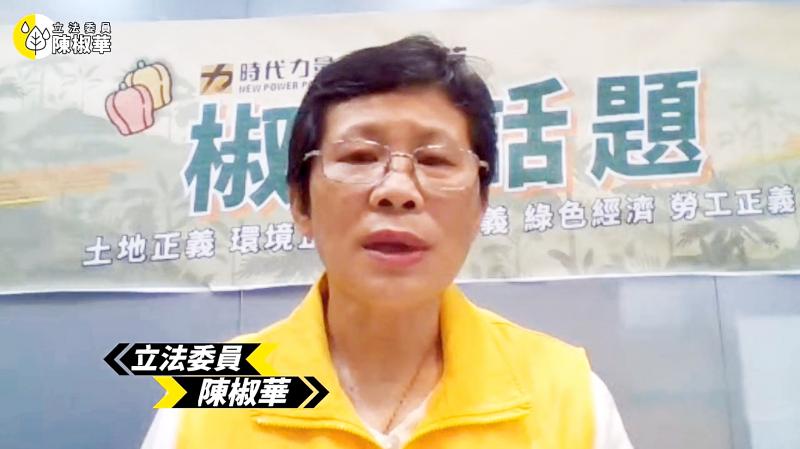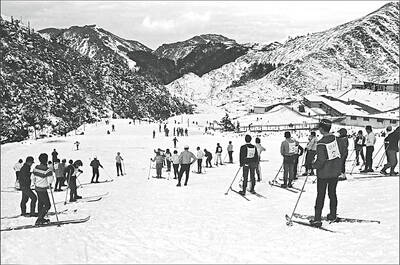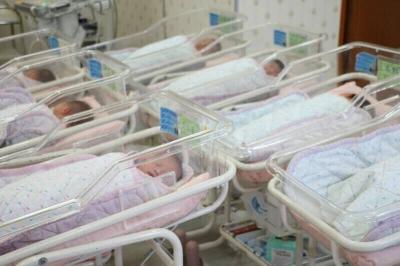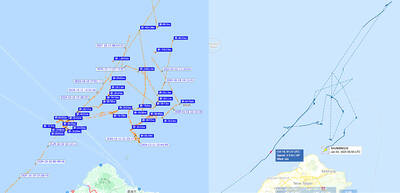Having rapid COVID-19 test kits available at stores would not effectively block community spread of the virus, as people might not report the results, the New Power Party (NPP) said yesterday.
NPP Legislator Chen Jiau-hua (陳椒華) hosted an online news conference after the Ministry of Health and Welfare on Saturday last week approved five rapid test kits for sale.
Three of the products were imported from the US, one from South Korea and the other is made in Taiwan, with their accuracy rates ranging from 85 to 97 percent, the ministry said.

Photo: Wu Shu-wei, Taipei Times
Test kits have been available at convenience and drug stores since Tuesday, while supermarket chain Pxmart began selling them yesterday.
NPP spokeswoman Wu Pei-yu (吳佩芸), who is also a pharmacist, said that the government does not have a mechanism for people to report test results, while false positives or negatives might create an infection loophole.
“People might not report negative results, which might actually be false negatives,” Wu said. “In such cases, they might inadvertently be virus spreaders in their community.”
Although people who purchase rapid test kits at convenience stores and supermarkets are referred to pharmacies if they have questions, pharmacists might not be familiar with kits that they do not stock, she said.
Importers submitted performance reports from other countries when they applied for permissions to sell their kits in Taiwan, Chen said.
The Food and Drug Administration (FDA) should collect local data to ensure that test results are as accurate as the manufacturers claim, she said.
Chien Chia-hung (錢嘉宏), deputy head of the FDA’s medical devices and cosmetics division, said that test kits should be easy to use, while manufacturers are required to provide written and video instructions online, as well as contact information.
Written instructions should contain a QR code to video instructions, Chien said.
“Pharmacists are not obligated to consult people if they are asked about a test kit that they do not stock,” he said.
Test results can be skewed if people do not follow the instructions properly or kits were not properly stored, Chien said.
People are encouraged to review government-approved test kits on the FDA Web site as well as instructions before they make a purchase, he said, adding that consumers and medical institutions should report defective products.
Manufacturers should regularly submit data to the FDA, he said.
“Rapid test kits for COVID-19 are not must-have household items, and test results are more useful in areas with relatively more confirmed cases,” Chien said.
Moreover, people “should go to community screening stations immediately if they have symptoms indicating possible COVID-19 infection,” he said.

DEEPER REVIEW: After receiving 19 hospital reports of suspected food poisoning, the Taipei Department of Health applied for an epidemiological investigation A buffet restaurant in Taipei’s Xinyi District (信義) is to be fined NT$3 million (US$91,233) after it remained opened despite an order to suspend operations following reports that 32 people had been treated for suspected food poisoning, the Taipei Department of Health said yesterday. The health department said it on Tuesday received reports from hospitals of people who had suspected food poisoning symptoms, including nausea, vomiting, stomach pain and diarrhea, after they ate at an INPARADISE (饗饗) branch in Breeze Xinyi on Sunday and Monday. As more than six people who ate at the restaurant sought medical treatment, the department ordered the

A strong continental cold air mass and abundant moisture bringing snow to mountains 3,000m and higher over the past few days are a reminder that more than 60 years ago Taiwan had an outdoor ski resort that gradually disappeared in part due to climate change. On Oct. 24, 2021, the National Development Council posted a series of photographs on Facebook recounting the days when Taiwan had a ski resort on Hehuanshan (合歡山) in Nantou County. More than 60 years ago, when developing a branch of the Central Cross-Island Highway, the government discovered that Hehuanshan, with an elevation of more than 3,100m,

Taiwan’s population last year shrank further and births continued to decline to a yearly low, the Ministry of the Interior announced today. The ministry published the 2024 population demographics statistics, highlighting record lows in births and bringing attention to Taiwan’s aging population. The nation’s population last year stood at 23,400,220, a decrease of 20,222 individuals compared to 2023. Last year, there were 134,856 births, representing a crude birth rate of 5.76 per 1,000 people, a slight decline from 2023’s 135,571 births and 5.81 crude birth rate. This decrease of 715 births resulted in a new record low per the ministry’s data. Since 2016, which saw

SECURITY: To protect the nation’s Internet cables, the navy should use buoys marking waters within 50m of them as a restricted zone, a former navy squadron commander said A Chinese cargo ship repeatedly intruded into Taiwan’s contiguous and sovereign waters for three months before allegedly damaging an undersea Internet cable off Kaohsiung, a Liberty Times (sister paper of the Taipei Times) investigation revealed. Using publicly available information, the Liberty Times was able to reconstruct the Shunxing-39’s movements near Taiwan since Double Ten National Day last year. Taiwanese officials did not respond to the freighter’s intrusions until Friday last week, when the ship, registered in Cameroon and Tanzania, turned off its automatic identification system shortly before damage was inflicted to a key cable linking Taiwan to the rest of